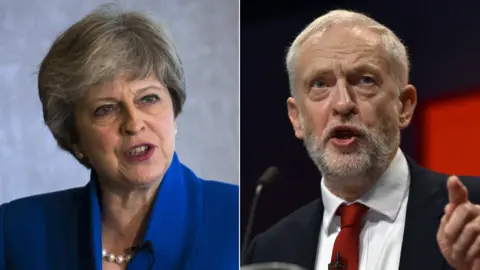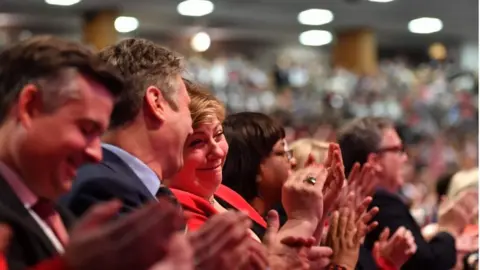Capitalism: Jeremy Corbyn v Theresa May
 EPA/BBC
EPA/BBCAfter Labour leader Jeremy Corbyn's proud socialism, pride in the free market from the prime minister.
Theresa May's speech at the Bank of England, the place where her career began 40 years ago, was one of a political leader painting her instincts in primary colours; and, she will hope, in stark contrast to her opponent.
Some people used to grumble that the big two political parties at Westminster sounded the same.
You will have heard the critique. You may have agreed with it: Politics fought in what some saw as the mushy managerial middle; where the Conservatives and Labour argued over who was the most competent administrator, rather than over big ideas.
Well, no more.
This week has seen first Mr Corbyn, and now Mrs May, returning to first principles.
It has also shown how the vim and vigour of Labour's conference, the emotional victory they have snatched from mathematical defeat at the general election, has prompted Downing Street to take on their arguments, quickly and robustly.
And it has shown how a confident Mr Corbyn, with the cheering of his name in the Brighton conference hall still ringing in his ears, can provoke a prime minister to make an argument few of her recent predecessors have felt the need to.
 AFP
AFPCapitalism faced a "crisis of legitimacy" the Labour leader claimed. The free market economy was the "greatest agent of collective human progress ever created", Theresa May responded.
She did, though, as when she first became prime minister, attempt to talk to those who reckon Jeremy Corbyn is on to something.
"If you want to preserve and improve a system which has delivered unparalleled benefits, you have to take seriously its faults," she said.
Expect this argument to be one she returns to as Conservatives gather for their conference this weekend.
But don't expect Tory activists, still winded by their election set-back, to be chirpily singing their leader's name in the bars and conference venues of Manchester.
